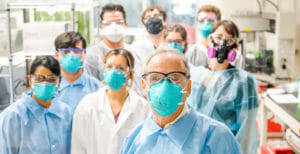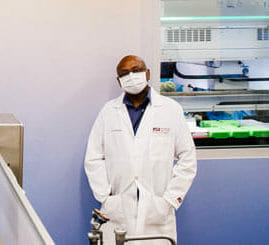
The Biodesign Clinical Testing Laboratory at Arizona State University has received accreditation from the College of American Pathologists (CAP), the nation’s largest organization of board-certified pathologists.
The CAP Accreditation Committee has awarded accreditation based on results of rigorous onsite inspection as part of the CAP’s accreditation programs.
Since the start of the pandemic, the Biodesign Institute at ASU has dedicated its specialized resources to mass testing for COVID-19 and sequencing genomes of the viral pathogen SARS CoV-2.
On October 8, ASU announced the lab’s milestone of 1 million COVID-19 tests. The prestigious accreditation is the latest benchmark of excellence for the clinical testing lab, which has played a vital role in COVID-19 surveillance across the state, including in underserved communities.
Dr. Carolyn C. Compton, the facility’s director, was advised of this national recognition and congratulated for the excellence of the services being provided.
“CAP accreditation is widely recognized as the highest bar for a clinical laboratory and signifies excellence on all levels. It is not easily attained for any laboratory,” Compton said. “I am especially proud that the ABCTL was able to achieve this while under the duress of an international pandemic.”
Compton, board certified in both anatomic and clinical pathology, is a professor in ASU’s School of Life Sciences.
The ASU Biodesign Clinical Testing Laboratory is one of more than 8,000 CAP-accredited facilities worldwide. The U.S. federal government recognizes the CAP Laboratory Accreditation Program, begun in the early 1960s, as being equal-to or more-stringent-than the government’s own inspection program.

During the CAP accreditation process, designed to ensure the highest standard of care for all laboratory patients, inspectors examine the laboratory’s records and quality control of procedures for the preceding two years. CAP inspectors also examine laboratory staff qualifications, equipment, facilities, the lab’s safety program and record, and overall management.
“It is deeply gratifying to see the hard work and dedication of all involved in the clinical testing lab recognized with this important accreditation,” said Joshua LaBaer, executive director of the Biodesign Institute and director of the Biodesign Virginia G. Piper Center for Personalized Diagnostics. “The accreditation helps us continue the outstanding services we provide in terms of statewide COVID-19 surveillance, as well as expand our laboratory operations to address other threats to public health.”
The Biodesign Clinical Testing Laboratory had already been certified by the Clinical Laboratory Improvement Amendments or CLIA, designed to ensure quality handling and testing of diagnostic samples. CLIA is administered through The Food and Drug Administration (FDA), The Centers for Medicare & Medicaid Services (CMS), and the Centers for Disease Control and Prevention (CDC). Each agency plays a specific role in assuring quality laboratory testing. The new CAP accreditation further solidifies the clinical lab’s standing as a facility of excellence.
The Biodesign clinical testing lab was the first in the West and in the state of Arizona to offer saliva-based testing for COVID-19. This less invasive method provides highly accurate results, is less labor intensive and requires fewer medical personnel.

The lab’s web-based portal and case tracking system has provided a streamlined system for COVID-19 monitoring, with extremely rapid turnaround times from sample submission to diagnosis, an essential requirement for the tracking of the rapidly evolving pandemic.
“When we started ABCTL, our goal was to setup a CLIA laboratory that meets and exceeds CLIA regulatory requirements” said Vel Murugan, associate director of research and an associate research professor at the Biodesign Virginia G. Piper Center for Personalized Diagnostics. “Accreditation by CAP is an attestation to ABCTL’s quality laboratory practices and the integrity of the results that we generate. We aim to continuously demonstrate excellence in laboratory practices”
The newly CAP-accredited clinical testing lab is the first of its kind at ASU and fulfills the university’s ambitions to apply leading-edge science in the service of the community and its wellbeing.
About the College of American Pathologists
As the world's largest organization of board-certified pathologists and leading provider of laboratory accreditation and proficiency testing programs, the College of American Pathologists (CAP) serves patients, pathologists, and the public by fostering and advocating excellence in the practice of pathology and laboratory medicine worldwide. For more information, READ THE CAP ANNUAL REPORT at cap.org
The Biodesign Institute at Arizona State University integrates leading-edge research in biology, engineering and computer science to address challenging problems posed by disease, depletion of natural resources and threats to security. Understanding and emulating nature is essential to solving these problems and is the unifying thread in the highly diverse research of the institute. The collaborative structure of Biodesign is designed to accelerate discoveries and translate them into real-world applications in health care, engineering and environmental sustainability. For information, visit www.biodesign.asu.edu